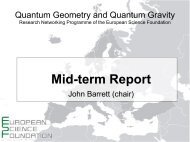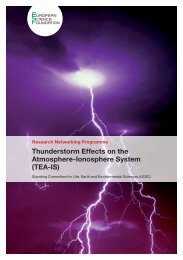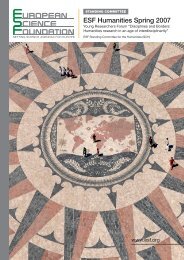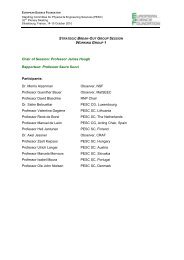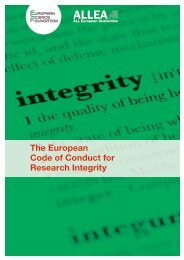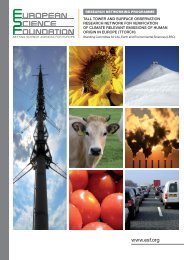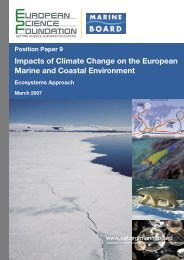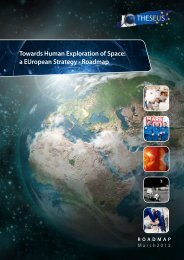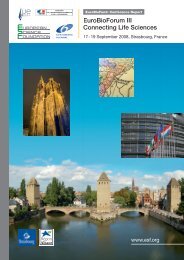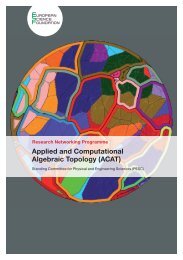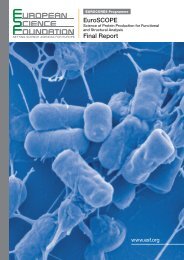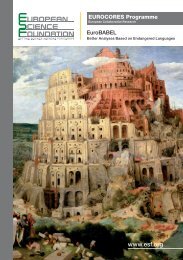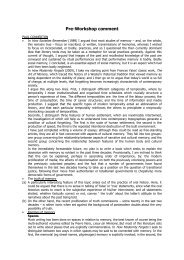Synthesis Report - European Science Foundation
Synthesis Report - European Science Foundation
Synthesis Report - European Science Foundation
Create successful ePaper yourself
Turn your PDF publications into a flip-book with our unique Google optimized e-Paper software.
io-engineering projects and authoritarian ecoregimes(e.g., Brown, 2009; Shearman and Smith,2007; Victor et al., 2009). While it is clear thatpart of the problems the world is currently facingare linked to some intentional or unconscious (historicaland present) choices toward a technological,engineering-based society, and that some or parts ofthose problems could be addressed through sometechnological solutions, it is now understood thatsociety is heavily dependent on technology-associatednatural (finite) resources (e.g., energy, water,land, rare-earth elements) and on unfairly used ordistributed human resources (e.g., cheap labour, lackof work safety, child work). Society is thus facingnew (i.e., never experienced before) challenges thatrequire a strong, integrated research mix of natural,physical, social sciences and humanities. Underlyingmany of these arguments is a growing recognitionthat responses to the complex environmental andsocial challenges of the 21st century require a radicallydifferent approach to education and capacitybuilding. Education appears to play a critical rolein developing understanding and building capacityto act, i.e., to address the complex, non-linearand potentially irreversible environmental changesassociated with human activities (RESCUE, 2009).There is, however, concern that most universitiesand research institutes are limited in their deliveryof the type of interdisciplinary or transdisciplinaryknowledge needed to address environmental problems;they certainly are not delivering as quickly asscientific findings suggest is necessary.Since the 19th century, a powerful and highlysuccessful model for education and capacity buildinghas predominated in the Western world, whichhas been exported to all corners of the world. Thismodel has been built around the demands of theindustrial era, and includes the development ofdisciplinary expertise, academic autonomy, andtransmission of knowledge and information todevelop a society that promotes material and technologicalprogress and achievement. In recent years,this model has (in many parts of the world) includeda greater role for the private sector, with an emphasison standardisation, learning* outcomes, andperformance indicators. As Sterling (2001, p.40)argues, “[t]his managerial approach in educationreflects mechanistic beliefs in determinism andpredictability – which leads in turn to a belief inthe possibility and merits of control.” The approachfavours educating people to adapt to change, ratherthan building their capacity to shape and createchange (Sterling, 2001).However, in light of scientific and socialadvances, strong evidence is accumulating that anew phase of systematic education and capacitybuilding in sustainable development/sustainabilitywill be needed, which integrates a diversity of methodsand goals at all levels (e.g., Hesselink et al., 2000;Adams, 2006; Hoffman and Barstow, 2007; Jörg etal., 2007; Esbjörn-Hargens et al., 2010; Jones et al.,2010). From the practices of pre-school and schooleducation to institutions for higher education, andfrom the learning and knowledge diffusion activitiesof scientific research to adult learning and skillacquisition, the challenge is to synthesise and applythe latest findings from a range of fields, includingpsychology (e.g., Gilbert, 2011), cognitive science,teaching methods, creativity and collaborativeknowledge creation to transform education such thatit can meet the challenges and uncertainties of globalenvironmental change. New approaches to researchand education are now seen as the foundation forbuilding the capacity to respond to environmentalchange. Suggested approaches include Radical InterandTransdisciplinary research Environment (RITE)(RESCUE Collaboration), and a greater emphasis onsystems analysis, higher-order thinking and ‘resiliencethinking’ (Walker and Salt, 2006; Reid et al.,2008; Fazey et al., 2007; Sterling, 2010; Krasny etal., 2011). Knowledge, it has been argued, can nolonger be seen as separate and disconnected fromactors and policy processes, and new methods andapproaches to collecting, managing and interpretingdata are regarded as necessary to understanddynamic changes.In short, it is becoming clear that ‘business asusual’ or ‘more of the same’ will no longer be suitable,and that nothing less than a ‘revolution’ ineducation and capacity building is needed to confrontthe challenges posed by global environmentalchange. The changes in education and capacitybuilding that are needed in response to contemporaryand future environmental and social challengeswill require more than adjustments in current educationalsystems, research funding strategies andinterdisciplinary collaborations. While such interventionsmay be important and necessary, theyrepresent ‘first order changes’ or ‘doing more of thesame, but better’ (Sterling, 2001). Instead, RESCUERevolution argues that there is a need to promotesecond- or even third-order changes that involvere-thinking systems by “seeing things differently”(Sterling, 2001, p.28). In other words, the revolutionin education and capacity building is not simply atechnical problem, defined by Heifetz et al. (2009)as a problem that has known solutions that can beimplemented through current know-how, but alsois an adaptive challenge that can only be addressedthrough changes in people’s mindsets, priorities,21Responses to Environmental and Societal Challenges for our Unstable Earth (RESCUE)



